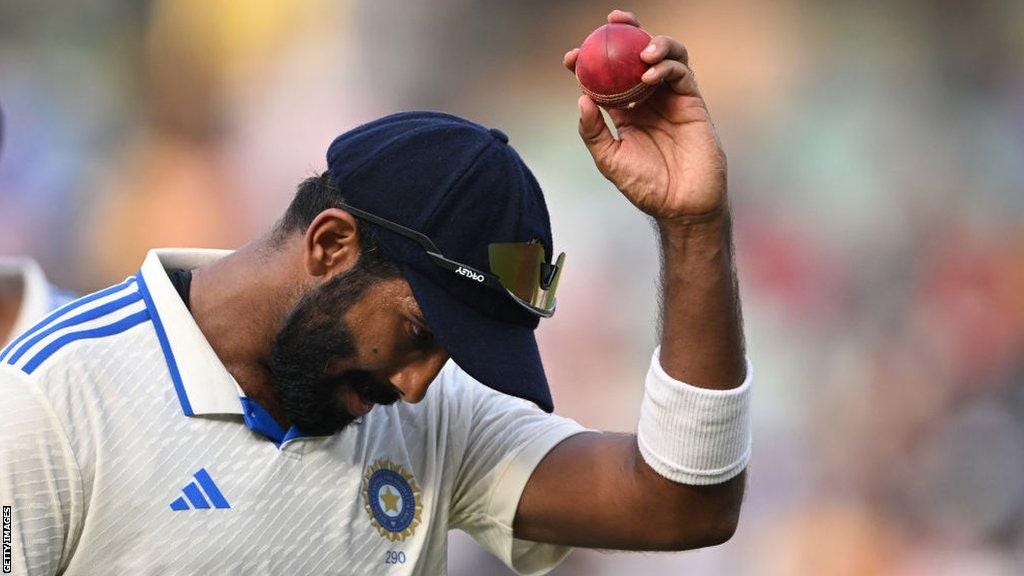“I love cricket more than captaincy,” Jasprit Bumrah explained, in his typical sedate manner.
In an interview with Dinesh Karthik (who is fast becoming one of my favourite broadcasters), Bumrah opened up about his decision to rule himself out of the Test captaincy.
It was for the same reason that Hardik Pandya wasn’t made T20 captain last year. Workload. The difference was that in Bumrah’s case, the concerns over his workload stemmed more from within.
The recent tour of Australia felt like the turning point. It simultaneously boosted Bumrah’s captaincy credentials and took away from them. India’s only win of the series came under him, and Rohit Sharma’s struggles with the bat only compounded the belief that it was his team.
Leadership was a light load on his broad shoulders, and he ended up as the man of the series with 32 wickets at an average of 13. But rewriting the narrative of Indian fast-bowling and cricket machismo proved back-breaking. Bumrah’s body gave up on him in the fifth Test, in what eventually turned out to be a stress-related injury to the lower-back.
He subsequently missed England’s white-ball tour early in the year and wasn’t a part of India’s Champions Trophy-winning side either.
After consulting with “people who manage his back”, including his surgeon, he informed the BCCI he doesn’t want to be considered for a leadership role.
Shubman Gill will be leading the team for the five-Test series in England, of which Bumrah will be playing three. The ability to ordain which games he will play was another reason he cited for turning down the captaincy.
A Test tour of England is one of the most high-profile fixtures on India’s calendar. Their last series win came in 2007, and in the three tours since the head-to-head record stands at 13-4 in England’s favour. With all due respect to newly-crowned WTC champions South Africa, who will be touring at the end of the year, this is Bumrah and India’s biggest assignment until next year’s T20 World Cup.
And yet, there has hardly been a murmur of dissent around India’s best player deciding to play just three Tests. The lack of reaction is reflective of two things. One, his stature in the game. Just think back to India’s felicitation at the Wankhede Stadium last year after their T20 WC triumph, where Virat Kohli used the occasion to call on the BCCI to allow Bumrah to manage his schedule as he saw fit.
And two, how we are in the era of the sustainable athlete.
Developments in sports-science and technology have transformed the lifespans of sportspersons. They are better equipped to take care of their bodies than those of previous eras have ever been. The access to data also means that they are hyper-aware of their limits.
Bumrah’s decision to scale back his workload feels a strategy of less eventually being more. Somewhere, there must also be a recognition that he actually hasn’t played a lot of Tests. The 31-year-old has played significantly fewer Tests (46) than his contemporaries Kagiso Rabada (71) and Pat Cummins (68), both of whom are in the same age-bracket as him.
Kapil Dev, Ishant Sharma and Zaheer Khan - the three Indian fast bowlers above him on the all-time wickets leaderboard - had all played more Tests than him by this stage.
Managing your load in your early 30s will undoubtedly have a greater restorative effect on the body than taking up veganism and teetotaling (hello Ben Stokes) when you’re 34.
In today’s world of instant gratification, we have been programmed to view athletes as content creators we have perennial access to. It’s why a showstopper like Bumrah asking for rest can feel like an unfathomable act of rebellion.
He isn’t the first to do so. Across sport today, you’ll see stories of athletes being intentional in their battle against burnout. Last month, England’s star defender Millie Bright ruled herself out of selection for the upcoming Euros due to mental and physical exhaustion.
"As much as I want to be out there running through brick walls for England and fighting alongside my teammate, stepping back is the right thing for my health, my future in the game and most importantly the team," she said in a statement.
This is a player coming off a season in which she had captained Chelsea to a domestic treble that included an unbeaten league campaign.
Carlos Alcaraz, to the chagrin of his coaches, pencils in downtime at Ibiza nightclubs as a part of his recovery. In the fascinating Netflix docuseries ‘My Way’, he speaks of how he needs that time away from the toils of the circuit to keep himself refreshed.
LeBron James takes a clean break from playing basketball in the first six-eight weeks following an NBA season. The time away gives him the space to nurse the niggles and bandage the bruises, and also allows for a mental reset. On his podcast Mind the Game, he spoke of how after crossing the 15-year mark in the league, inspiration becomes a tough commodity to access. Giving himself the chance to miss the game keeps him coming back.
Modern sport isn’t just survival of the fittest. It’s survival of who has the most energy.
Consumption Corner
Listen: I’m a sucker for narrative journalism and this Guardian series on the disappearance of environmental journalist Dom Phillips in the Amazon’s Javari Valley is beyond
Watch: I was recently shamed into watching Derry Girls by a couple of friends. After finishing the show last week, I understand why my confession of never having watched it was seen as blasphemy. The series tracks the escapades of a chaotic group of school girls in 1990s Northern Ireland during a time of deep political strife.
Read: The recent French Open has once again made me question why I don’t follow tennis more closely. Riding the wave of this annual love-in, I’ve begun reading The Warrior, a biography on Rafa Nadal’s relationship with clay.




